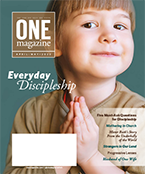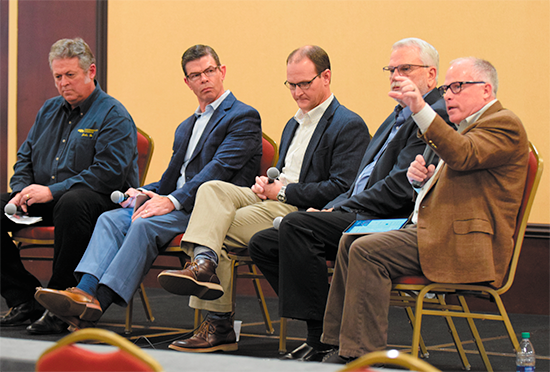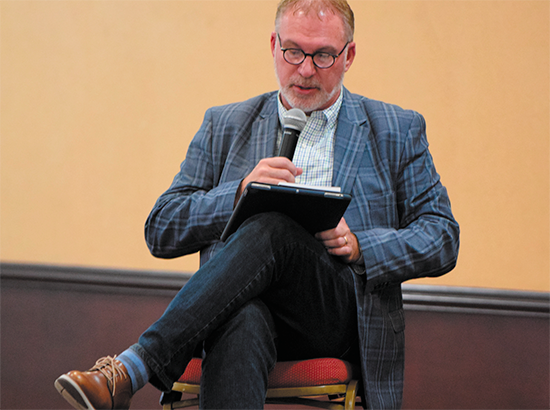
April-May 2022
Everyday Discipleship
------------------
|





Huband of One Wife: Panel Discussion, 2022 Leadership Conference
Moderated by Ron Hunter Jr., Ph.D.
In 2017, Doug Carey wrote Randall House proposing a book on the biblical phrase, “husband of one wife” and whether someone divorced could pastor a church. I read the letter, made a snap judgment, and said, “No way!” Then I called a half dozen conservative pastors across the denomination seeking counsel. Without exception, they all told me the denomination needs to be talking about this.
I was blown away by the interest. I replied to Doug, proposing a book containing more than his view. We invited ten pastors and state leaders to start meeting twice a year at the Leadership Conference and National Convention. Over the next four years, the book evolved into the work now published with five authors and an editor.
We divided up the five most common positions, preferences, or principals held regarding this important passage. Each writer was tasked to start with exposition from Scripture from a particular viewpoint and expand upon it. We sought four Free Will Baptist writers to tackle the non-traditional views and asked Dr. Chris Shirley, professor and program chair of all master’s degrees at Southwestern Seminary to address the traditional view.
Authors Dr. Danny Baer, Dr. Jeff Blair, Doug Carey, Dr. Jeff Manning, and Mike Trimble formed a panel at the 2021 Leadership Conference, and Dr. Eddie Moody, executive secretary, asked me to emcee. Below is a summary of that 45-minute panel discussion. Our goal is not to change anyone’s mind. Please don’t think a national agency is recommending something; that’s not our goal. In fact, we have no control or authority. Our job is to help people wrestle with Scripture.
When reading a book, never skip the introduction; you find the thesis there. In this book, the prologue and epilogue tell Carey’s story. Panelists constantly reminded the audience we are not the Holy Spirit. We are simply sharing what has been gleaned from Scripture; the Holy Spirit will do his part and guide your convictions to come down where needed.
Question for Dr. Jeff Manning: Based on 1 Timothy 3:1-7, if we take Scripture literally, without interpretation, some argue a pastor is required to be married, since Scripture says he must be the husband of one wife. What theological or practical corners do we back ourselves into if we make marriage a prerequisite?
Manning: A dear friend shared about not being married during a period in his own ministry. Someone contested the viability of him being a pastor. What issues does that stance raise? For starters, Paul, the very author God used to give us these qualifications and write multiple books of Scripture would not have been qualified, as he was not a married man. If you hold that one must be married to be a pastor, the One who bled, suffered, and died for our sins would also not be qualified to pastor because, obviously, Jesus was not a married man.
The same qualifications used to argue one must be married, requires he also have children because he must rule his household well with his children under proper tutelage from him. If you hold that view, is he qualified only after he has more than one child? Because Scripture, in both places, talks about children plural. If we require a pastor to be a married man, what happens if his wife dies. Think about how this could play out. A pastor’s wife could die on a Tuesday, and he could attend her funeral Saturday and resign Sunday because he’s no longer qualified. That sounds super simplistic, but that is the corner we find ourselves in if we argue that a pastor must be a married man.

Question for Mike Trimble: In 1 Timothy 3, did Paul place more weight on the husband of one wife requirement than the other requirements?
Trimble: First Timothy 3 has a list of qualifications: above reproach, the husband of one wife, sober-minded, self-controlled, respectable, hospitable, able to teach, not a drunkard, not violent but gentle, not quarrelsome, not a lover of money, must manage his own household well, keep his children submissive, must not be a recent convert, and must be well-thought-of by outsiders. Out of the 15 qualifications, it appears most of us are only concerned about one of them—husband of one wife. Everyone gravitates toward the one, often ignoring the other 14. We’ve all seen quarrelsome, high-profile evangelical ministers who pastored and brought great harm to the cause of Christ. We must look at why there are 15. We took one qualification and ignored 14 others that carry identical weight and are equally inspired by God.
Question for Dr Jeff Blair: In the associational polity we practice, with autonomy of the local church at the top moving through the district, state, and national association at the bottom, how should we deal with differences on such issues?
Blair: In Dr. Baer’s chapter, he points out the word divorce does not occur anywhere in our Treatise. The Treatise, as the authoritative document articulating Free Will Baptist beliefs and practices, doesn’t address this issue, nor does it suggest what all Free Will Baptists must do or believe about it. Obviously, if someone says, “I don’t believe in the possibility of apostasy,” that’s simple. Just turn to the page and say, “This is not who we are.” But divorce is not articulated in the Treatise and will come up through a local church if it’s going to come up. The district association is where this will be handled.
Question for Jeff Manning: In every author’s chapter, we find some real “aha” moments. I want to highlight one from yours, Dr. Manning. You used two insightful words regarding a pastor’s marital status, how would you differentiate between the Bible’s expectations and stipulations?
Manning: This whole question regarding whether a pastor or staff minister is married hit home for me about seven years ago when we were looking for a youth minister. My son Jake submitted his resume, and I stepped away from the process for obvious conflict-of-interest reasons. The search committee did their due diligence. Jake was the man they thought they should recommend. At the time, Jake was in a serious relationship, but the relationship ended. I thought he would be a married man by the time he started, and suddenly, he was not going to be anywhere close.
It’s legitimate for churches to expect pastors to be married; Scriptures are written in such a way that a vast majority will be married, and if he is, he is to be a one-woman man. If he does have children, he is to rule them. But you can’t make that a stipulation like he must not be quarrelsome, he must not be given to wine, he must be able to teach. If you do, you find yourself in a corner that leaves you without any biblical legitimacy whatsoever. Expect a man to be married but don’t make it a stipulation.
Question for Mike Trimble: What other items in the 1 Timothy 3 list of qualifications need more emphasis?
Trimble: The easy answer is all of them. Dr. Manning’s excellent chapter addresses expectations versus stipulations. Is the list a set of guardrails, or what we really want out of a man who has been faithful for a lifetime? Is he faithful to his wife, self-disciplined? You must decide if every item in Paul’s list works the same as: if the guy is divorced, he’s gone, not even to be considered.

I’ve randomly picked four qualifications to play this “sit down if…” game. So, would everyone stand up. We’re going to just take above reproach, which means perfect, blameless, and carries the idea of devoted, devout faithfulness. Sit down if you’ve ever been imperfect or unfaithful.
All right, another shot. The word gentle, not violent but gentle. This word means kind or gracious. Sit down if you’ve ever been unkind to someone. What about the qualification: well thought of by outsiders? This includes someone outside your church, including a church you left previously. Do they have anything to say against you, believed you acted inappropriately, unkind, not gentle?
You would say, “Come on, give a little grace here; I’m a growing believer.”
And I’m saying, if you want grace, where is the grace for those who struggle with the husband of one wife issue? We have to come to terms with how we apply the complete list and treat all qualifications the same.
Question for Dr. Danny Baer: What do you feel is the biggest barrier in restoring a fallen brother to ministry?
Baer: I don’t think there is any question the biggest barrier is us. We’re much quicker to shoot our wounded than to pick them up and help. We’re more likely to ask someone else about the person rather than call the person and ask directly. There are moments when I should have picked up the phone or put an arm around someone hurting—we’re the barrier.
Question for Doug Carey: Can you tell us with complete integrity and honesty you preach God’s intended design for the home to your congregation about marriage and divorce, or would your church say you’re soft on that topic?
Carey: It’s a valid question. At the beginning of my return to ministry, some thought, “He’s been through this; he’ll change his preaching or be soft on it.”
I’ve been anything but soft. For anyone who experienced it, or had a child experience it—even a biblical divorce is horrific. Because I know the pain, I never hesitate to share from a biblical viewpoint. My churches and my wife can attest to nearly 30 years of sermons on divorce. It’s made me more compassionate when folks come to me with marital problems or talk to me about divorce. I could reach them as never before. I shed tears with them and tell them I feel their pain. I’m not suggesting we must experience it to know. While it made me more compassionate, it hasn’t changed my preaching. As preachers, we stand for Truth.
Question for Dr. Danny Baer: In your chapter, you weren’t willing to state your position regarding a divorced minister returning to the role of pastor. Can I put you on
the spot and ask if you’re willing to share it now?
Baer: I was unwilling to share in the book for a couple of reasons. Like Dr. Blair said, such practices are decided by the local church and associations. The Committee on Denominational Research learned 76% of associational ordaining councils use divorce as a litmus test. It’s a yes or no question. However, 7% will ordain him if divorce occurred prior to salvation.
When I was first ordained and received my yearly card, that was the main qualification. Things have changed a lot since I was a young man. Even our consideration for divorce has changed as churches are allowing divorced people as members, they teach classes, and sit on church boards. With this happening, you probably don’t see them as living in adultery by remarrying after divorce.
Paul did not mention divorce here, but when it comes to pastors, we do. Let me make it clear. In this book, no one is in favor of divorce. Jesus wasn’t in favor of divorce. Paul wasn’t in favor of divorce. Divorce has never been God’s plan, but if you examine how husband of one wife is more a qualitative than quantitative concern, then Paul meant one man devoted to one woman.
We need to look at the broad context of all Scripture and not simply a yes or no answer. For it to be a biblical divorce, Jesus made allowance for infidelity, Paul made allowance for abandonment. And if you’re divorced legally in the sight of man and God, you are no longer married to that person, and if you get remarried you don’t have two living wives.
There are qualifications, and we must consider what these words say and what God intended them to mean, and I think we ought to give consideration while still preaching that God hates divorce. Marriage to one woman for life is still God’s plan.
About the Author: Since 2002, Ron Hunter Jr., Ph.D. has served as executive director and CEO of Randall House & D6 Family Ministry. He pastored 11 years before starting his present role. Hunter has five published books and is passionate about leadership and discipleship.
|
|

